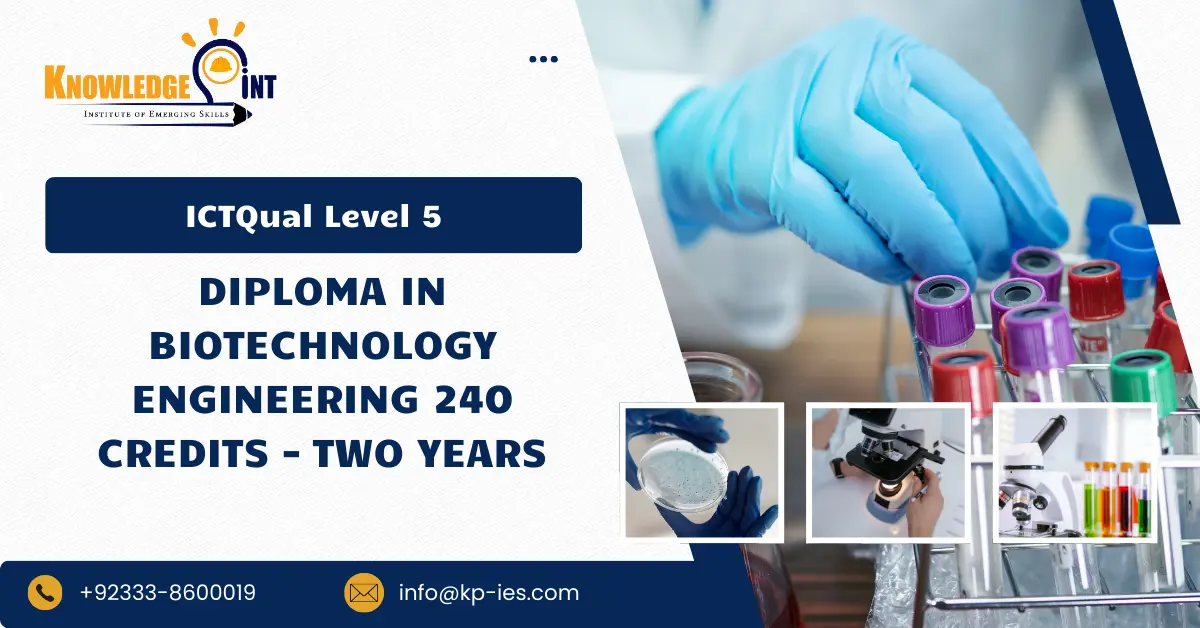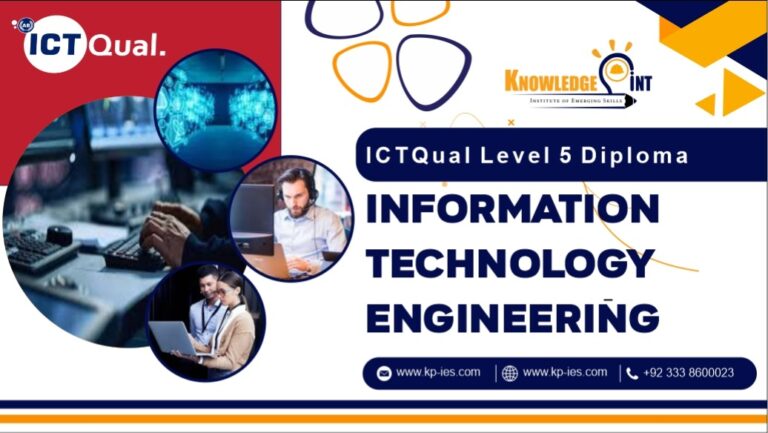The ICTQual Level 5 Diploma in Biotechnology Engineering is a comprehensive two-year program designed for aspiring professionals seeking to make a mark in the dynamic and ever-evolving field of biotechnology. With a total of 240 credits, this qualification offers an in-depth curriculum that combines theoretical knowledge with practical applications to prepare learners for advanced studies or careers in biotechnology and related industries.
The Level 5 Diploma in Biotechnology Engineering equips students with the essential knowledge, skills, and competencies needed to excel in biotechnology. The course focuses on core areas such as genetic engineering, bioprocessing, molecular biology, and bioinformatics, ensuring that learners are well-prepared for the challenges of modern biotechnology.
ICTQual is renowned for its high-quality education, industry-aligned curriculum, and commitment to student success. Enrolling in the Level 5 Diploma in Biotechnology Engineering ensures:
Course Overview
The ICTQual Level 5 Diploma in Biotechnology Engineering 240 Credits – Two Years consists of 24 mandatory units which are as follows.
Year 1:
- Introduction to Biotechnology Engineering
- Molecular Biology and Genetics
- Principles of Biochemistry
- Cell Biology and Biotechnology Applications
- Bioinformatics and Data Analysis
- Bioprocessing Techniques and Technologies
- Genetic Engineering and Recombinant DNA Technology
- Biotechnology Equipment and Instrumentation
- Laboratory Safety and Quality Control
- Microbiology and Biotechnology
- Plant and Animal Biotechnology
- Industrial Biotechnology and Biomanufacturing
Year 2:
- Biostatistics and Experimental Design
- Environmental Biotechnology
- Bioethics and Regulatory Considerations
- Biochemical Engineering Principles
- Protein Engineering and Expression Systems
- Fermentation Technology in Biotechnology
- Bioprocess Control and Optimization
- Biotechnology in Drug Development
- Biotechnology in Agriculture and Food Production
- Biotechnology in Waste Management
- Research and Development in Biotechnology
- Professional Practice and Career Development in Biotechnology
Learning Outcomes for ICTQual Level 5 Diploma in Biotechnology Engineering
Year 1 Learning Outcomes
- Introduction to Biotechnology Engineering
- Understand the history, scope, and applications of biotechnology in various sectors.
- Identify key areas of biotechnology, including healthcare, agriculture, and industrial processes.
- Molecular Biology and Genetics
- Explain the structure and function of nucleic acids and proteins.
- Understand genetic inheritance, mutations, and the molecular basis of diseases.
- Principles of Biochemistry
- Analyze the chemical properties and functions of biomolecules.
- Apply biochemistry principles to understand metabolic pathways and energy production.
- Cell Biology and Biotechnology Applications
- Demonstrate knowledge of cell structure, function, and communication.
- Apply cellular principles to biotechnology applications, such as tissue engineering.
- Bioinformatics and Data Analysis
- Utilize computational tools to analyze biological data.
- Interpret genomic, proteomic, and transcriptomic datasets for biotechnological research.
- Bioprocessing Techniques and Technologies
- Understand the fundamentals of bioprocessing, including fermentation and downstream processing.
- Operate basic bioprocessing equipment and optimize production systems.
- Genetic Engineering and Recombinant DNA Technology
- Design and implement experiments involving gene cloning and recombinant DNA.
- Evaluate the applications and ethical considerations of genetic engineering.
- Biotechnology Equipment and Instrumentation
- Operate and maintain essential biotechnology laboratory equipment.
- Interpret results obtained from analytical instruments like spectrophotometers and centrifuges.
- Laboratory Safety and Quality Control
- Adhere to laboratory safety protocols and quality assurance standards.
- Develop risk assessments and manage laboratory waste safely.
- Microbiology and Biotechnology
- Understand the role of microorganisms in biotechnology.
- Isolate, culture, and utilize microbes for biotechnological applications.
- Plant and Animal Biotechnology
- Apply biotechnological methods to improve plant and animal health, yield, and productivity.
- Explore techniques such as micropropagation, transgenics, and cloning.
- Industrial Biotechnology and Biomanufacturing
- Examine the role of biotechnology in industrial processes, such as biofuels and biomaterials.
- Develop strategies for scaling up biomanufacturing systems.
Year 2 Learning Outcomes
- Biostatistics and Experimental Design
- Apply statistical methods to analyze and interpret experimental data.
- Design experiments with reproducible and accurate results.
- Environmental Biotechnology
- Understand the role of biotechnology in addressing environmental challenges.
- Develop biotechnological solutions for waste management and pollution control.
- Bioethics and Regulatory Considerations
- Evaluate ethical and legal considerations in biotechnology practices.
- Understand global regulatory frameworks governing biotechnology.
- Biochemical Engineering Principles
- Integrate engineering principles with biotechnology processes.
- Analyze systems such as fluid dynamics and heat transfer in bioprocessing.
- Protein Engineering and Expression Systems
- Design and produce recombinant proteins for industrial and therapeutic use.
- Optimize expression systems for improved protein yields.
- Fermentation Technology in Biotechnology
- Operate fermentation systems and optimize conditions for microbial growth.
- Analyze the role of fermentation in producing biofuels, enzymes, and pharmaceuticals.
- Bioprocess Control and Optimization
- Implement control strategies for bioprocess monitoring.
- Optimize yield and efficiency in biotechnological production systems.
- Biotechnology in Drug Development
- Explore the role of biotechnology in designing and producing biopharmaceuticals.
- Apply principles of molecular biology to drug discovery and vaccine development.
- Biotechnology in Agriculture and Food Production
- Implement biotechnological solutions to enhance crop yield and resistance.
- Develop sustainable and innovative approaches to food production.
- Biotechnology in Waste Management
- Utilize microbial and enzymatic methods for waste treatment and recycling.
- Design biotechnological systems for sustainable waste management.
- Research and Development in Biotechnology
- Conduct independent research projects in biotechnology.
- Develop innovative solutions to real-world biotechnological challenges.
- Professional Practice and Career Development in Biotechnology
- Build effective communication, teamwork, and leadership skills for professional growth.
- Explore career opportunities and develop strategies for continuous learning and industry engagement.
The ICTQual Level 5 Diploma in Biotechnology Engineering 240 Credits – Two Years offers a range of benefits for students pursuing a career in the rapidly growing field of biotechnology. Below are the key advantages:
1. Comprehensive Skill Development
- Gain advanced theoretical knowledge and practical expertise in biotechnology, covering genetics, bioprocessing, bioinformatics, and environmental sustainability.
- Acquire hands-on experience with modern laboratory techniques, enhancing technical proficiency.
2. Industry-Relevant Curriculum
- Study a curriculum aligned with current industry needs, preparing you for roles in pharmaceuticals, agriculture, healthcare, and industrial biotechnology.
- Explore cutting-edge technologies like CRISPR, nanobiotechnology, and synthetic biology, ensuring readiness for future advancements.
3. Practical Application and Research
- Participate in laboratory sessions and real-world projects to apply learned concepts effectively.
- Undertake a capstone project to solve real-world biotechnology challenges, demonstrating research and problem-solving skills.
4. Career Opportunities
- Equip yourself with a versatile skill set suitable for roles such as biotechnologist, genetic research scientist, bioinformatics specialist, and more.
- Gain an edge in competitive industries such as healthcare, environmental technology, and biomanufacturing.
5. Pathway to Further Education
- Provides a strong foundation for postgraduate studies, such as master’s or doctoral programs, in specialized areas of biotechnology.
6. Ethical and Regulatory Competence
- Understand and navigate ethical dilemmas and regulatory frameworks, ensuring compliance in biotechnology practices.
- Develop a responsible and sustainable approach to innovation and implementation.
7. Professional Development
- Build skills in project management, teamwork, and professional communication, crucial for leadership roles in the biotechnology sector.
- Develop a professional network through internships and industry placements.
8. Contribution to Societal Progress
- Be part of solutions addressing global challenges, including sustainable agriculture, renewable energy, and healthcare innovation.
The ICTQual Level 5 Diploma in Biotechnology Engineering 240 Credits – Two Years opens up several pathways for further education and career advancement in the rapidly evolving field of biotechnology. Below are some key areas for future progression for graduates of the course:
1. Postgraduate Education
- Master’s Degree in Biotechnology or Related Fields:
- Specialize in areas like bioinformatics, genetic engineering, pharmaceutical biotechnology, or environmental biotechnology.
- Examples: MSc in Molecular Biology, MSc in Bioprocess Engineering, or MSc in Biomedical Sciences.
- Doctoral Studies (PhD):
- Conduct advanced research in biotechnology, contributing to scientific innovation and technological advancements.
- Pursue opportunities in academic or industrial research settings.
2. Professional Certifications
- Obtain specialized certifications to enhance expertise and employability in key areas:
- Certified Biotechnologist (CBT)
- Good Manufacturing Practices (GMP) Certification
- Bioinformatics Specialist Certification
- Quality Assurance and Regulatory Compliance Certification
3. Career Opportunities
Graduates can access diverse career paths across industries such as healthcare, agriculture, pharmaceuticals, and environmental science:
- Research and Development (R&D):
- Roles in innovation for medical treatments, biofuels, or sustainable agriculture.
- Biotechnology Specialist Positions:
- Biotechnologist, Bioprocess Engineer, Genetic Analyst, or Bioinformatics Specialist.
- Regulatory and Quality Roles:
- Compliance Officer or Quality Assurance Specialist in biotechnology firms.
- Environmental and Industrial Biotechnology:
- Roles in waste management, renewable energy, and industrial fermentation.
4. Entrepreneurship
- Leverage skills to establish biotech startups focusing on innovative solutions in healthcare, agriculture, or sustainable technologies.
5. Cross-Disciplinary Fields
- Combine biotechnology knowledge with other domains to pursue interdisciplinary roles:
- Biotech Marketing and Sales: Promote biotechnology products and services.
- Science Communication: Bridge the gap between complex biotech innovations and public understanding.
- Policy Making: Contribute to science policy and regulation in governmental or global organizations.







